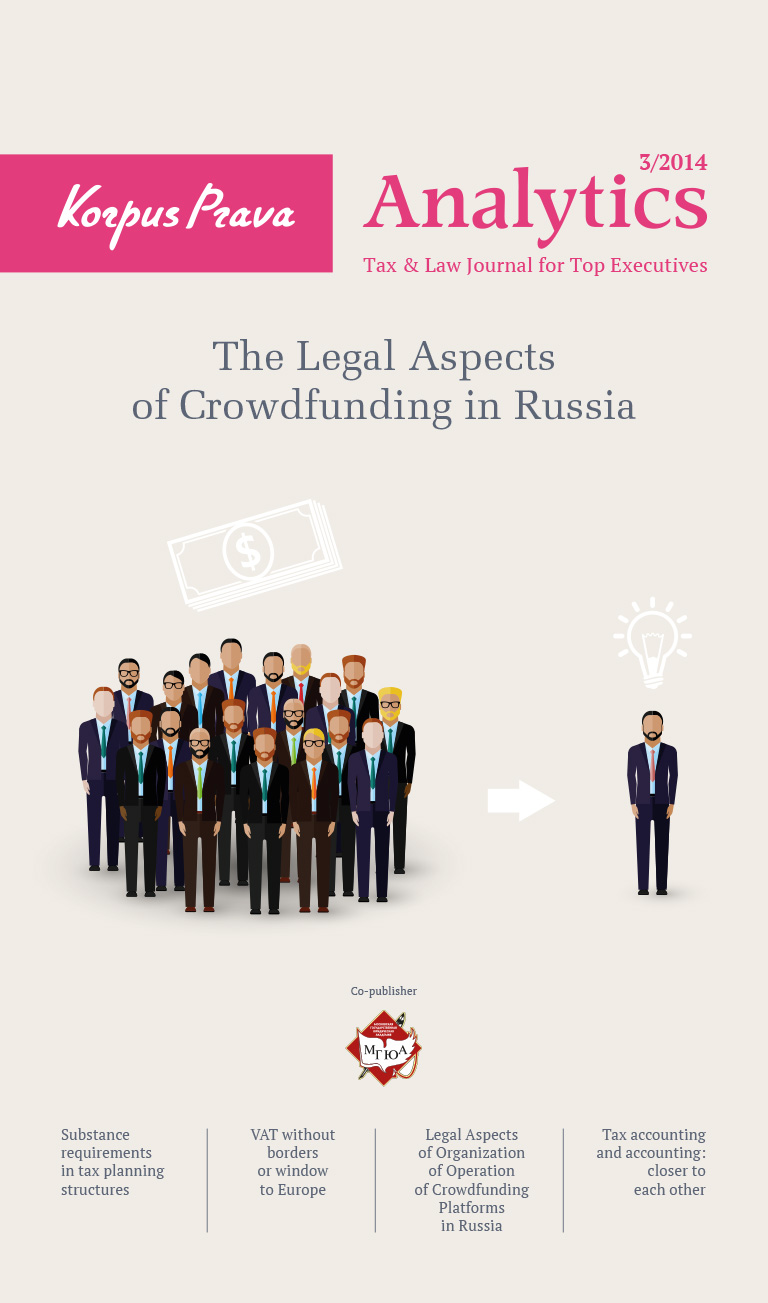- Cyprus Citizenship Scheme for Foreign Investors
- Squeezed But Pleased: Taxation of Passive Income in the European Union
- VAT Without Borders or Window to Europe
- Legal Aspects of Organization of Operation of Crowdfunding Platforms in Russia
- Substance Requirements in Tax Planning Structures
- “Deposit Splitting” of Individuals. Legal Civil and Criminal Aspects
Tax Law Changes in Cyprus
In July 2015, the Minister of Finance of the Cyprus Government announced, at a press conference, the transmission to the House of Representatives of a package of tax Bills which he characterized as a very significant Tax Reform. The Bills were enacted and introduced by the Government aiming on the encouragement of further investments in Cyprus and the invigoration of the economic activity.
The first set of Bills were voted into law by the House of Representatives on 9th July 2015 and were enter into force on 16th July 2015 upon their publication to the Official Gazette of the Republic of Cyprus.
The second set of Bills, were passed into law on 10th December 2015 and published in the Official Gazette of the Republic of Cyprus whereupon they bestowed with force and effect.
It should be stressed that some of the amendments introduced as a result of the Council Directive (EU) 2015/121 of 27th January 2015 which amended Directive 2011/96/EU on the common system of taxation applicable in the case of parent companies and subsidiaries of different Member States.
In this Article, we are dealing with the following legal updates which the Tax Reform brought about to Income Tax Law (“ITL”) on both of the aforesaid enacting stages:
- First Employment in Cyprus – Exemption.
- Neutralization of foreign exchange gains or losses.
- Capital allowances.
- Group Loss Relief.
- Tax on Exploitation of Natural Resources.
- Adjustments on arm’s length transactions between related parties.
Employment in Cyprus by Non Tax Residents
Any Employment
The ITL grants an exemption on any employment commences in Cyprus by any person residing outside Cyprus before the commencement of his/her employment. The exemption is equal to the lower amount of either the 20% of the remuneration received by the employee or the amount of 8 550 Euro.
The application of the exemption begins from the 1st January of the year following the year that the employment commenced.
The Law has been amended to the extent relating to the time period that the exemption applies. Previously, the exemption used to apply for a period of three (3) years.
After the amendment, the exemption is granted with a ceiling of five (5) years, with a time horizon until the year 2020. Also, the exemption now relates to employments commenced on or after the year 2012. The exemption applies for each tax year.
Employments where remuneration exceeds the amount of 100 000 Euro
The ITL grants an alternative exemption on employment income to the one granted by section 8(21) of the Law that has been described above.
Again, the foundation of the exemption is the same: it relates to an employment commenced in Cyprus by a person residing outside Cyprus before the commencement of his/her employment. The exemption equals to the 50% of the person’s remuneration received from any employment in Cyprus.
The exemption used to be granted for five (5) years, starting from the year that the employment was commenced.
The amending Law has extended the duration of the exemption to ten (10) years, whilst it has made the qualification criteria more stringent or more definite.
In particular:
- The exemption is granted for a period of ten (10) years during which the employment is exercised in Cyprus, starting from the year of employment, provided, of course, that the employment income exceeds the amount of 100 000 Euro per annum;
- The exemption is not granted to a person who used to reside (i.e. tax resident) in Cyprus in any three (3) out of the five (5) tax years preceding the year in which the relevant employment commenced, neither to a person residing in Cyprus in the year preceding the year in which the employment commenced;
- The exemption is granted in any year in which the income from employment in Cyprus exceeds the 100 000 Euro per annum, irrespective of whether the employment income may fall below 100 000 Euro at any particular year, provided that when the employment commenced, the employment income exceeded 100 000 Euro per annum (i.e. the employment income exceeded 100 000 Euro on the first year of employment) and the Commissioner is satisfied that the change in the annual income from the employment in the Republic is not an arrangement with the objective of taking advantage of the exemption;
- The exemption provided under the provisions of section 8(21) above is not granted where this section 8(23) applies.
Neutralization of Foreign Exchange Gains
The amending Law has introduced a new exemption relating to gains deriving from the fluctuation of foreign exchange rates and the resulting differences.
In particular, the newly introduced provisions provide the following:
General Principle
Any gain resulting from foreign exchange differences due to the fluctuation of exchange rates is exempt, excluding profit resulting from foreign exchange trading.
Qualifications
Provided that a person who engages in foreign exchange trading may elect, irrevocably, so that unrealized exchange differences are not subject to tax and are not tax deductible, inasmuch as they relate to gains and losses, respectively. The irrevocable election is submitted in a form approved by the Commissioner, together with the next tax return that the person is obliged to submit after the entry into force of the provisions of this exemption, provided that the tax return is submitted within the time limit provided under Article 5 of the Assessment and Collection of Taxes Law.
Definitions
- The term “profit resulting from exchange differences” includes profit from rights or currency derivatives;
- The term “exchange differences trading” includes trading in rights or currency derivatives.
Capital Allowances
Section 10(2) of ITL stipulates that in ascertaining the chargeable income of any person carrying on business there shall be allowed a deduction of a reasonable amount for the exhaustion and wear and tear of any assets of the company arising out of their use in the business during the year of assessment.
According to the Law before its amendment, for all machinery and plant that had been acquired during the years of assessment 2012 until 2014, a deduction for wear and tear at 20% was allowed, whereas for industrial and hotel premises acquired during the same period of time, a deduction at 7% was allowed. The amending Law has extended the acquisition period from 2014 to 2016 (inclusive).
Group Loss Relief
The ITL allows a resident company (“surrendering company”) to surrender (assign) its losses to another company resident in the Republic, provided that they are both members of the same group of companies for the whole year of assessment.
The amending Law has extended the definition of the “surrendering company” into a company which has its seat and is tax resident in a member state, provided it has exhausted all the possibilities to set off or carry forward the tax losses it has incurred, in the state of tax residence or in another member state where possibly an intermediate holding company is located.
Tax on Exploitation of Natural Resources
The recent oil and gas exploration activities within the exclusive economic zone of the Republic of Cyprus brought about the need to introduce a specific provision in the Law governing the taxation of the companies involved in the exploration, extraction or exploitation of natural resources within the EEZ of the Republic.
In particular, section 23A of the ITL provides that the gross amount or other income stemming from sources within Cyprus, by any person who is not resident in Cyprus, as consideration for services carried out in Cyprus in connection with the extraction, exploration or exploitation of the seabed, subsoil or natural resources and the establishment and operation of pipelines and other installations on the ground, seabed or on the surface of the sea, is liable to tax at the rate of five per cent (5%).
Adjustments on Arm’s Length Transactions
Section 33 of ITL encapsulates the well-known principle of arm’s length in connection with transactions between related parties.
In particular, for the purposes of the ITL, the concept of “arm’s length” apply where in the commercial or financial relations or transactions between connected persons, in the sense defined in the Law, conditions are made or imposed between those persons which differ from those which would be made between independent businesses, then any profits which would have accrued to one of the businesses, but have not so accrued by reason of those different conditions, may be included in the profits of that business and taxed accordingly.
The amending Law took the concept a step forward raising any injustice that might occur to the parties by the adjustment of the profits. Specifically, it stipulates that two taxable persons or businesses infringe the “arm’s length” principle in their dealings or transactions and the Commissioner increases the profits or benefits of the one, a deduction shall be granted to the other person or business equal to the increase in the profit or benefit of the business.
Your subscription to our journal will definitely boost the efficiency of your specialists and downsize your expenses for consultants.
The journal is available free of charge in the electronic version.
Free Download

